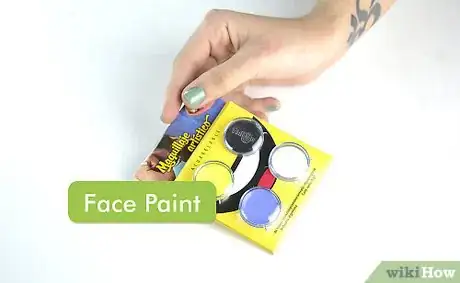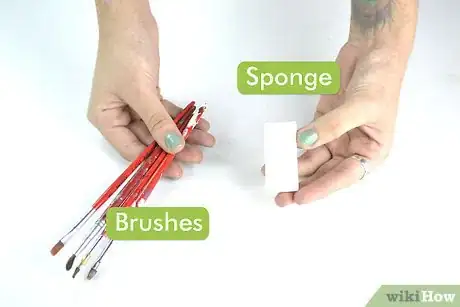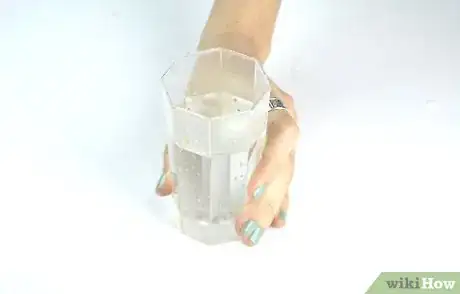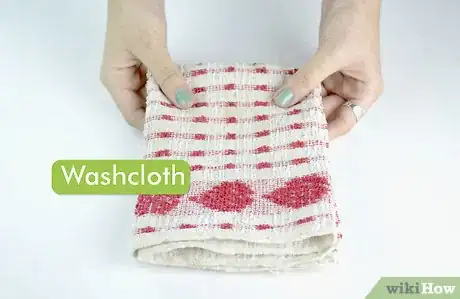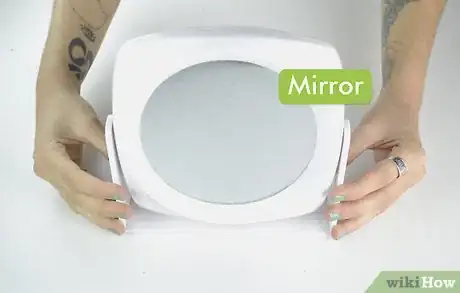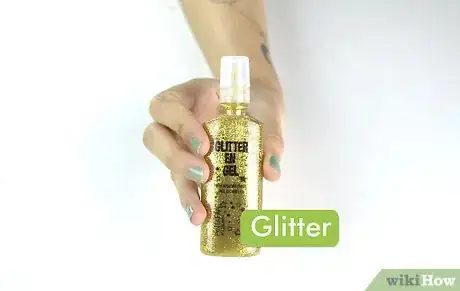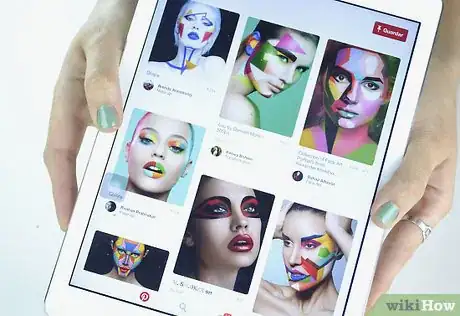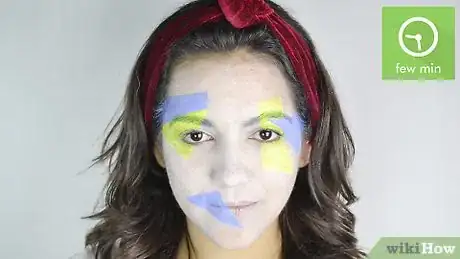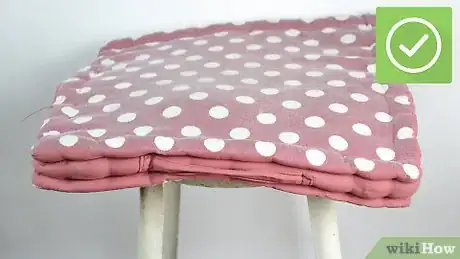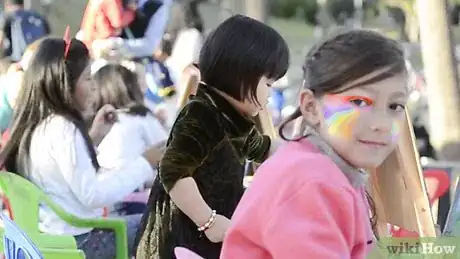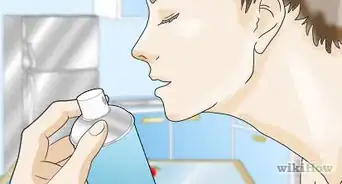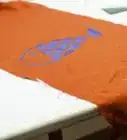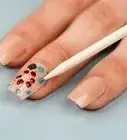This article was co-authored by wikiHow staff writer, Kyle Hall. Kyle Hall works on the content team at wikiHow. He helps manage our team of editors and creates content for a variety of wikiHow projects. Kyle continually looks for new ways to improve the content at wikiHow and make it more helpful and enjoyable for readers. He graduated from Eckerd College in 2015, where he majored in Political Science.
The wikiHow Video Team also followed the article's instructions and verified that they work.
This article has been viewed 460,986 times.
Learn more...
Knowing how to face paint is a great skill to have at birthday parties and around Halloween time. If you've never face painted before, you'll need to put together a kit with all the right supplies, like face paints, brushes, and a mirror. Once you've got all your painting gear, you can use your tools to paint a design on someone's face. With some practice and patience, you can start painting beautiful designs on people's faces in no time.
Steps
Getting the Supplies
-
1Get an assortment of paints designed for face painting. Make sure the paints you use are non-toxic. They should say right on the label that they’re made specifically for face painting. If you’re just starting out, get a colorful palette and a neutral palette.[1]
- You can find face paints online or at your local arts and crafts store.
-
2Stock up on face painting brushes and sponges. Use round, thin tip brushes for smaller details and flat, wide brushes for larger details. Have at least three brushes of each size in your face painting kit; one for black paint, one for white paint, and one for color paint. Having different brushes for different colors will prevent the colors from mixing.[2]Advertisement
-
3Get a plastic cup for water. You’ll need water to mix with the face paints and for rinsing off your brushes. Any normal plastic drinking cup will work.[3]
-
4Find a couple washcloths to wipe your brushes off on. Get cheap washcloths since they’ll be getting stained with paint regularly. Washcloths are great because you can wash and reuse them whenever you want to face paint.[4]
-
5Have a mirror available to show people how great their face paint looks. A small handheld mirror will work. If you’re going to do face painting at a big event or party, bring along two mirrors in case one of them breaks.[5]
-
6Don’t forget the glitter. Buy non-toxic, cosmetic-grade glitter from the craft store and add it to your face painting kit. Add glitter over paint to make it shimmer and pop.[6]
- Make sure you use cosmetic-grade glitter. Cosmetic-grade glitter won’t hurt if it gets in someone’s eye.
Painting People’s Faces
-
1Ask the person how they’d like their face painted. If they’re unsure, show them some photos of different face painting designs they can choose from. Just make sure you can replicate any designs you’re showing them so they’re not disappointed in the end!
-
2Use a photo as a reference. Don’t be afraid to look at the photo every once in a while to make sure you’re painting the design right. If you don’t have any printed photos available, look one up online using your smartphone. Search something like “lion face paint” or “butterfly face painting design.”
-
3Add the base of your design with a sponge. Dip the tip of your sponge in water. Don’t soak the sponge, you only want there to be a few drops of water on it. Rub the wet corner of the sponge onto the color paint you want to use, rubbing in circular motions. Gently dab the tip of the sponge onto the person’s face to apply the color.[7]
- If the color isn’t vibrant enough, add more water and paint to the tip of the sponge.
-
4Add a second color to the base for a more intricate design. Use a different sponge or clean off the sponge you used to apply the first color. Choose a color that will blend well with the first color. Keep in mind that colors opposite each other on the color wheel contrast nicely, but they don’t blend well together.
- For example, if you’re painting a butterfly and you’ve made the base of the wings purple, a blue would blend well while a yellow would not.
- Apply the second color with the wet tip of the sponge, but use a dry section of the sponge to blend the colors together.
-
5Let the first coat of paint dry. After a few minutes, lightly touch the paint with the tip of your finger to see if it's dry. If any paint comes off on your finger, let the paint finish drying. Once the paint is completely dry, continue painting.
-
6Use your brushes to add detail to the design. Dip one of your brushes in water and rub the bristles on the color paint you want to use. Make sure the brush isn’t dripping wet or the paint might run on the person’s face. For smaller details, make light strokes with the thin edge of the brush. Use the flat side of the brush to make bolder, thicker lines.[8]
- When you’re finished with one color, clean the brush or grab a new brush to use with a new color.
- Use a thin brush to add shadows and highlights with black and white paint.
-
7Fix mistakes with a baby wipe. Gently brush the baby wipe over the spot you want to erase. You can also use a baby wipe to round out edges in your design.
-
8Show the person your work with the mirror. Ask them if they like it. If they seem upset or disappointed, offer to fix the design or add more detail.
Making People Comfortable
-
1Put a cushion on the chair people will be sitting in. Use a pillow if you don't have a cushion. People will be less likely to move around in their seat if they're comfortable.
-
2Distract people while you're painting their face. Tell them a story. Explain what you're painting on their face and how you're doing it. Ask them questions about themselves. Distracting people will make the time go by faster and they won't get as antsy.
- For example, if you're painting kids' faces at a party, you could ask them things like "Are you having fun with your friends today?" or "What games are you excited to play later?"
-
3Paint simple designs on kids' faces. Kids may have a hard time sitting still for a long period of time. Picking easy designs for kids' faces will shorten the amount of time they have to sit in the chair so they won't get as restless.
- If you're working with a particularly restless kid, wrap up your design as soon as possible.
Community Q&A
-
QuestionI am going to be face painting a group of children at an elementary school. How can I make a good impression and ensure that they have a good time?
 Community AnswerTalk to the child and ask them questions, such as their favorite color, animal, or super hero. If the child is young, ask him or her to focus on an object behind you; this will keep the child from squirming too much and will allow you to finish faster. The longer the child has to sit in the chair, is more impatient he or she will get.
Community AnswerTalk to the child and ask them questions, such as their favorite color, animal, or super hero. If the child is young, ask him or her to focus on an object behind you; this will keep the child from squirming too much and will allow you to finish faster. The longer the child has to sit in the chair, is more impatient he or she will get. -
QuestionCan I use oil paint?
 Community AnswerAbsolutely not. Oil paint, like the kind artists use, are dangerous to put on skin. If you must use an oil-based paint, try theatrical oil-based paint or grease paint (ie: Ben Nye). You can find them online, in costume shops, and in certain well-stocked party supply shops.
Community AnswerAbsolutely not. Oil paint, like the kind artists use, are dangerous to put on skin. If you must use an oil-based paint, try theatrical oil-based paint or grease paint (ie: Ben Nye). You can find them online, in costume shops, and in certain well-stocked party supply shops. -
QuestionHow do I face paint a dalmatian?
 Charlotte GardnerCommunity AnswerPaint the base first, using white facepaint. Sponge on the approximate shape of a dalmatian's face: nose on the child's nose, muzzle on the child's upper lip, ears on the forehead, and the child's own eyes become the dog's eyes. Using a brush, add some black dalmatian spots. Do finishing work with a brush to enhance detail.
Charlotte GardnerCommunity AnswerPaint the base first, using white facepaint. Sponge on the approximate shape of a dalmatian's face: nose on the child's nose, muzzle on the child's upper lip, ears on the forehead, and the child's own eyes become the dog's eyes. Using a brush, add some black dalmatian spots. Do finishing work with a brush to enhance detail.
Things You’ll Need
- Face paint
- Brushes
- Sponges
- Plastic cup
- Washcloth
- Mirror
- Glitter
References
- ↑ http://www.parenting.com/gallery/easy-face-painting-ideas
- ↑ http://www.parenting.com/gallery/easy-face-painting-ideas
- ↑ https://www.youtube.com/watch?v=IUSEstwJ12c&feature=youtu.be&t=19
- ↑ https://www.youtube.com/watch?v=IUSEstwJ12c&feature=youtu.be&t=19
- ↑ https://www.youtube.com/watch?v=IUSEstwJ12c&feature=youtu.be&t=36
- ↑ http://www.parenting.com/gallery/easy-face-painting-ideas
- ↑ https://www.youtube.com/watch?v=3ZPKmks4FSM&feature=youtu.be&t=52
- ↑ http://www.parents.com/holiday/halloween/costumes/face-painting-ideas-/
About This Article
If you want to learn how to face paint, put together a kit with the right supplies so you can start making beautiful designs. Get an assortment of paints designed specifically for face painting as well as some face painting brushes and sponges. You’ll also want to have a mirror available to show people their face paint, washcloths to wipe your brushes off on, and some non-toxic, cosmetic-grade glitter to add shimmer and pop. When you’re ready to start painting faces, ask the person what design they’d like. Use photos for reference so you both know exactly what they want. Add the base of your design with a sponge, then use your brushes to add detail to your design. If you make any mistakes, use baby wipes to gently erase the spot and start over. To learn how to make people comfortable when you’re painting their face, keep reading!
